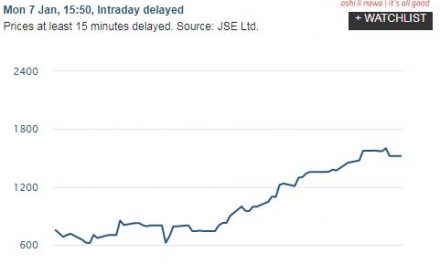
BMI forecasts 3% real GDP growth, expects more rate cuts

For the first time since the budgetary crisis of 2016, a reputable market research firm has come out with a growth estimate which would put the Namibian economy on a solid footing for recovery.
BMI Research, a unit of the Fitch Group, said last week Friday in a report on local interest rates, their forecast for GDP growth this year is 3%. BMI Research’s analysis is based on available data before the release of the revised National Accounts which showed that GDP growth in 2016, while still vastly disappointing, was not as bad as anticipated earlier. The official growth forecast for 2017 is still only 2.5% as published by the Ministry of Finance on 08 March 2017.
“While we still anticipate that a major increase in mining output will see the economy return to positive growth (forecasting 3.0% real GDP growth in 2017 up from 0.2% in 2016 ), the rest of the economy will continue to struggle” stated BMI Research.
The 3% GDP growth forecast was confirmed by Mr Peter Hoflich of BMI Research in Singapore, following an enquiry from the Economist.
After the Bank of Namibia cut the local repo rate by 25 basis points last week Wednesday, BMI now sees another interest rate cut, also 25 basis points, before the end of the year.
“Following its first cut to the policy rate in five years , we believe that the Bank of Namibia will enact further monetary easing in 2017. The Bank of Namibia cut the benchmark interest rate by 25 basis points to 6.75% on 16 August citing the need to stimulate growth and maintain the peg with the South African Rand (ZAR)” stated BMI adding that before the latest rate cut, they had only expected one rate cut this year but a change in policy by the South African Reserve Bank has now opened the door for a second rate cut.
“While we had initially expected only 25 basis points worth of cuts in total in 2017, we now believe a more dovish policy stance by the South African Reserve Bank, sluggish growth in Namibia and falling food prices will act as an incentive for the Bank of Namibia to cut further” said BMI.
“Consequently, we have revised our 2017 central bank policy rate forecast from 6.75% to 6.5%. In 2018 we expect the benchmark policy rate will remain on hold, as improving growth prospects limit the need for further stimulus” they said.
On inflation expectations, BMI said “we expect inflation will remain within the bank’s target band through the end of the year. Indeed, as we expect that food price pressure will remain limited and our Oil and Gas team have adjusted down their oil price forecast, we have revised our annual inflation forecasts for 2017 to 6.1% down from 6 .5%. The trend of reduced inflationary pressures will enable the Bank of Namibia to pursue further easing.”











































